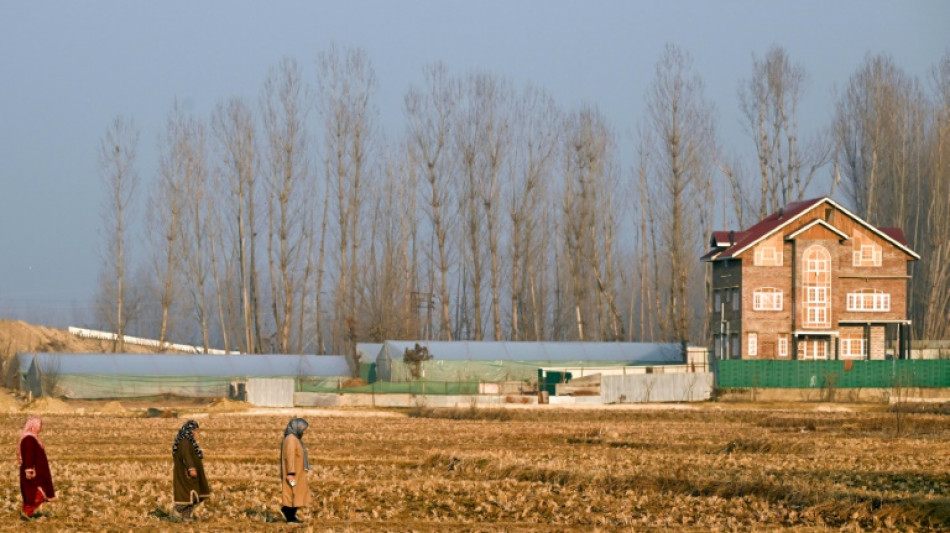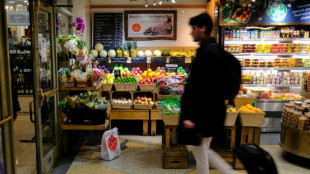
-
 'Not the end': Small US firms wary but hopeful on tariff upheaval
'Not the end': Small US firms wary but hopeful on tariff upheaval
-
US freestyle skier Ferreira wins Olympic halfpipe gold

-
 Svitolina edges Gauff to set up Pegula final in Dubai
Svitolina edges Gauff to set up Pegula final in Dubai
-
'Proud' Alcaraz digs deep to topple Rublev and reach Qatar final

-
 UK govt considers removing ex-prince Andrew from line of succession
UK govt considers removing ex-prince Andrew from line of succession
-
New study probes why chronic pain lasts longer in women

-
 Trump vows 10% global tariff after stinging court rebuke
Trump vows 10% global tariff after stinging court rebuke
-
Aston Martin in disarray as Leclerc tops F1 testing timesheets

-
 Venus Williams accepts Indian Wells wild card
Venus Williams accepts Indian Wells wild card
-
Anxious Venezuelans seek clarity on new amnesty law

-
 Last-gasp Canada edge Finland to reach Olympic men's ice hockey final
Last-gasp Canada edge Finland to reach Olympic men's ice hockey final
-
Scotland captain Tuipulotu grateful for Wales boss Tandy's influence

-
 Zelensky says no 'family day' in rare personal interview to AFP
Zelensky says no 'family day' in rare personal interview to AFP
-
Zelensky tells AFP that Ukraine is not losing the war

-
 Sweden to play Switzerland in Olympic women's curling final
Sweden to play Switzerland in Olympic women's curling final
-
Counting the cost: Minnesota reels after anti-migrant 'occupation'

-
 UK police probe Andrew's protection as royals reel from ex-prince's arrest
UK police probe Andrew's protection as royals reel from ex-prince's arrest
-
Doris says Ireland must pile pressure on England rising star Pollock

-
 US military assets in the Middle East
US military assets in the Middle East
-
Neymar hints at possible retirement after World Cup

-
 Stocks rise after court ruling against US tariffs
Stocks rise after court ruling against US tariffs
-
Australia end dismal T20 World Cup by thrashing Oman

-
 Olympics chief says Milan-Cortina has set new path for Games
Olympics chief says Milan-Cortina has set new path for Games
-
Russian SVR spy agency took over Wagner 'influence' ops in Africa: report

-
 Pegula fights back to sink Anisimova and reach Dubai final
Pegula fights back to sink Anisimova and reach Dubai final
-
Trump administration denounces 'terrorism' in France after activist's killing

-
 Colombia's Medellin builds mega-prison inspired by El Salvador's CECOT
Colombia's Medellin builds mega-prison inspired by El Salvador's CECOT
-
German broadcaster recalls correspondent over AI-generated images

-
 US Supreme Court strikes down swath of Trump global tariffs
US Supreme Court strikes down swath of Trump global tariffs
-
England's Itoje says managing 'emotional turmoil' key to 100 cap landmark

-
 Trump says weighing strike on Iran as Tehran says draft deal coming soon
Trump says weighing strike on Iran as Tehran says draft deal coming soon
-
Tudor is '100 percent' certain of saving Spurs from relegation

-
 Azam dropped for scoring too slowly, says Pakistan coach Hesson
Azam dropped for scoring too slowly, says Pakistan coach Hesson
-
Stocks volatile after soft US growth data, court ruling against tariffs

-
 Italy bring back Capuozzo for France Six Nations trip
Italy bring back Capuozzo for France Six Nations trip
-
From Malinin's collapse to Liu's triumph: Top Olympic figure skating moments

-
 Arteta urges Arsenal to 'write own destiny' after title wobble
Arteta urges Arsenal to 'write own destiny' after title wobble
-
Ukraine Paralympics team to boycott opening ceremony over Russian flag decision

-
 Wales captain Lake wants fans to bring 'noise' against Scotland
Wales captain Lake wants fans to bring 'noise' against Scotland
-
Skier Vonn's Italian hospital a hotbed of men, sister says

-
 India target S.Africa top order, Abhishek to come good: bowling coach
India target S.Africa top order, Abhishek to come good: bowling coach
-
Carrick praises Man Utd 'diversity' after Ratcliffe's immigrant rant

-
 I never thought it would be hit, says 'Scream' creator 30 years later
I never thought it would be hit, says 'Scream' creator 30 years later
-
AI summit statement delayed to 'maximise' signatories: India

-
 Barcelona's Sagrada Familia basilica hits peak height
Barcelona's Sagrada Familia basilica hits peak height
-
Milan sprints to second straight UAE stage win as Tiberi keeps lead

-
 US GDP growth misses expectations as Trump blames shutdown
US GDP growth misses expectations as Trump blames shutdown
-
Benfica investigate video of fans' monkey gestures

-
 French minister pledges tight security at rally for killed activist
French minister pledges tight security at rally for killed activist
-
Guardiola 'couldn't care less' about Arsenal stumble in title race


India's infrastructure push engulfs Kashmir farmers' land
Farmers in Indian-administered Kashmir say a major government infrastructure drive is taking their deeply cherished land, fearing it spearheads a push to "Hinduise" the disputed Muslim-majority territory.
Musadiq Hussain said that police "destroyed" his rice crop when a large chunk of his smallholding was expropriated to make way for a four-lane, 60-kilometre (40-mile) highway around the key city of Srinagar.
"It has affected my sense of who I am and my self-respect," said 41-year-old Hussain, adding he can no longer can grow enough rice and vegetables to feed his family.
"I feel like my mind is shrinking, just like my land."
Hussain's land was taken in 2018 but the process has intensified in recent years.
The road, along with other highways and railways, is also swallowing swathes of orchards prized for their almonds, apples and other fruit in the Himalayan region, split between India and Pakistan since 1947.
Prime Minister Narendra Modi's Hindu-nationalist government, which imposed direct rule in 2019, says that the multi-billion-dollar drive is bringing a "new era of peace" and "unprecedented development".
New Delhi says it will boost trade and tourism, while also bolstering military access across the restive territory and to strategic border zones with Pakistan and China.
- 'Settler colonial land grab' -
Authorities say construction within 500 metres (yards) on either side of the highway around Srinagar is banned.
But last year, authorities unveiled plans to build more than 20 "satellite townships" along the route, with drawings showing highrise developments it called a "Pearl in the Paradise".
Kashmiri political parties are demanding to know who the housing is for, accusing Modi's government of wanting to change Kashmir's demographic makeup to create a Hindu majority -- something the authorities do not comment on.
Goldie Osuri, who studies Indian policies in Kashmir at Britain's University of Warwick, uses a phrase often associated with Israel's occupation of the West Bank to describe the situation: a "settler colonial land grab".
"Kashmiri farmers... are being dispossessed of their land and livelihoods in the name of Indian development as 'a gift' for Kashmir," Osuri told AFP.
She called the project a bid to "'Hinduise' Kashmir at the expense of Kashmiri Muslims".
After New Delhi ended Kashmir's constitutionally enshrined partial autonomy in 2019, land laws also changed.
That allowed all Indians to buy land in Kashmir for the first time.
Thousands of acres of "state lands" were added to registers to attract outside businesses.
"This is a land grab in plain sight," said Waheed Ur Rehman Para, a member of Kashmir's local assembly.
Many say that has undermined previous land reforms that granted ownership or farming rights to hundreds of thousands of people.
It worries Kashmiri leaders.
"We want this land to remain ours", Modi critic Omar Abdullah, Kashmir's chief minister, told a rally last month. "Without it, what do we truly possess?"
But Siddiq Wahid, a historian at India's Shiv Nadar University, said that the region's political parties showed "no intent to unite, only to pull each other down".
"In this lazy politics lies the chief worry for us all", he said.
- 'Where will we go?' -
More than half a million Indian soldiers are in Indian-administered Kashmir, battling rebels who want independence or to be part of Pakistan.
Tens of thousands of people have been killed in the conflict since 1989 in the territory of some 12 million people.
Police have also seized land and properties --- including orchards, commercial buildings and homes -- of people with alleged links to rebel groups.
Exact figures for the total area requisitioned are not public. Landowners say that the compensation offered is sometimes too low, and some are suing the government.
In December, government authorities ordered the transfer of more than 600 acres (240 hectares) of orchards for a new university campus for the National Institute of Technology.
It sparked furious protests from the hundreds of families who depend on the almond and apple trees.
Elsewhere, in the village of Dirhama, farmers are angry at their land being requisitioned for a new train station, serving a 40-kilometre railway to an important Hindu shrine.
Standing in a field as snow fell, apple farmer Mohammad Ramzan said there was no room for a railway line.
"Where is the space? We all have our small patches of land. Where will we go?" asked the 78-year-old.
The plan has struck a nerve in Kashmir, where land and identity are deeply intertwined.
"This self-sustenance has ensured Kashmiri survival despite decades of curfews, strikes and uprisings," said Osuri.
Mohammad Shafi, a 61-year-old farmer, asked: "What is this development for when my family will be landless?"
M.Fischer--AMWN



